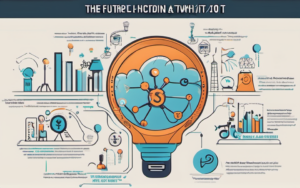The business landscape is constantly evolving, and emerging technologies are playing a pivotal role in shaping the future of how businesses operate. From artificial intelligence to blockchain, these innovations are disrupting traditional business models and creating new opportunities for growth and innovation.
The Rise of Disruptive Technologies
Emerging technologies are characterized by their transformative potential and their ability to disrupt existing industries. These technologies are rapidly advancing, making it essential for businesses to stay informed and adapt to their evolving capabilities.
Artificial Intelligence (AI)
AI is revolutionizing industries by automating tasks, analyzing large datasets, and personalizing customer experiences. AI-powered chatbots, for example, are transforming customer service by providing instant support and resolving queries efficiently. AI is also being used to optimize supply chains, predict demand, and personalize product recommendations.
Internet of Things (IoT)
The IoT connects physical devices and objects to the internet, enabling real-time data collection and analysis. This opens up new possibilities for businesses to monitor operations, optimize performance, and create new products and services. For example, smart factories are using IoT sensors to track production processes, identify bottlenecks, and improve efficiency.
Blockchain
Blockchain technology is a distributed ledger that provides a secure and transparent way to record transactions. It is gaining traction in industries like finance, supply chain management, and healthcare. Blockchain can enable businesses to streamline processes, reduce fraud, and improve trust and transparency in their operations.
Cloud Computing
Cloud computing provides businesses with on-demand access to computing resources, such as storage, servers, and software. It allows companies to scale their operations quickly and efficiently, reducing infrastructure costs and increasing flexibility. Cloud-based platforms are also enabling new business models, such as Software as a Service (SaaS) and Platform as a Service (PaaS).
Transforming Business Models
Emerging technologies are not only disrupting existing industries but also transforming traditional business models. Companies are adapting to the new realities by embracing innovation and finding ways to leverage these technologies to their advantage.
Automation and Efficiency
Emerging technologies are automating tasks and processes that were previously performed by humans. This is leading to increased efficiency, reduced costs, and improved productivity. For example, AI-powered robots are being used in manufacturing to perform repetitive tasks, while chatbots are handling customer service inquiries.
Personalized Customer Experiences
Emerging technologies enable businesses to collect and analyze customer data, providing insights into preferences and behaviors. This allows companies to personalize products and services, create targeted marketing campaigns, and enhance the overall customer experience. For instance, online retailers use AI-powered recommendation engines to suggest products based on past purchases and browsing history.
New Revenue Streams
Emerging technologies are creating new opportunities for businesses to generate revenue. For example, companies are developing subscription models for cloud-based services, offering data analytics services based on IoT data, or creating new products and services based on blockchain technology.
Data-Driven Decision Making
Emerging technologies are enabling businesses to collect and analyze vast amounts of data, providing insights that inform strategic decision-making. This data-driven approach allows companies to identify trends, predict market changes, and make informed decisions about product development, pricing, and marketing.
Examples of Business Model Innovation
Emerging technologies are driving innovation across diverse industries, leading to the emergence of new business models and transforming traditional ones.
E-commerce and Digital Retail
The rise of e-commerce has been fueled by advancements in technology, including online payment systems, logistics platforms, and personalized recommendation engines. Businesses are now able to reach global audiences and offer a wider range of products and services through online channels.
Healthcare and Telemedicine
Emerging technologies are revolutionizing healthcare delivery, with telemedicine platforms enabling remote consultations, remote monitoring, and virtual care. This is improving access to healthcare services, reducing costs, and enhancing patient outcomes.
Financial Services and Fintech
Fintech companies are leveraging emerging technologies like blockchain and AI to create new financial products and services, such as mobile payments, peer-to-peer lending, and digital investment platforms. This is increasing competition in the financial services industry and providing consumers with more choices and flexibility.
Manufacturing and Industry 4.0
The convergence of emerging technologies is driving the fourth industrial revolution, also known as Industry 4.0. This involves the integration of AI, IoT, and robotics into manufacturing processes, leading to increased automation, improved efficiency, and greater flexibility in production.
Challenges and Opportunities
While emerging technologies offer tremendous opportunities for innovation and growth, businesses also face challenges in adapting to their rapid evolution.
Adapting to Rapid Change
Emerging technologies are constantly evolving, requiring businesses to adapt quickly to new trends and developments. This can be a challenge, as it requires investment in training, infrastructure, and ongoing research and development.
Investing in New Technologies
Investing in emerging technologies can be a significant financial commitment. Businesses need to carefully assess the potential return on investment and choose technologies that align with their strategic goals.
Developing New Skills and Talent
Emerging technologies require specialized skills and talent. Businesses need to invest in training and development programs to equip their workforce with the necessary skills to leverage these technologies effectively.
Ethical Considerations
The use of emerging technologies raises ethical considerations. Businesses need to ensure that they are using these technologies responsibly and ethically, addressing concerns about data privacy, algorithmic bias, and the impact on employment.
The Future of Business Models
The future of business models will be shaped by the continued evolution of emerging technologies and their impact on various industries.
Hybrid Models and Integration
Businesses will likely adopt hybrid models that integrate traditional business practices with emerging technologies. This will involve combining physical and digital channels, leveraging AI and automation to enhance existing processes, and exploring new revenue streams enabled by blockchain and other innovations.
Sustainability and Social Impact
The focus on sustainability and social impact is expected to become increasingly important. Businesses will need to consider the environmental and social implications of their use of emerging technologies, developing sustainable solutions and addressing ethical concerns.
The Role of Human-Machine Collaboration
As emerging technologies become more sophisticated, the role of human-machine collaboration will become increasingly important. Businesses will need to find ways to leverage the strengths of both humans and machines, creating a synergistic relationship that drives innovation and efficiency.
Continuous Innovation and Adaptation
The future of business models will require continuous innovation and adaptation. Businesses need to stay informed about emerging technologies, explore new opportunities, and be prepared to embrace change to remain competitive in a rapidly evolving landscape.
The impact of emerging technologies on business models is undeniable. By embracing these innovations, businesses can unlock new opportunities for growth, efficiency, and innovation. As these technologies continue to evolve, companies that adapt and leverage their potential will be best positioned to thrive in the future.




